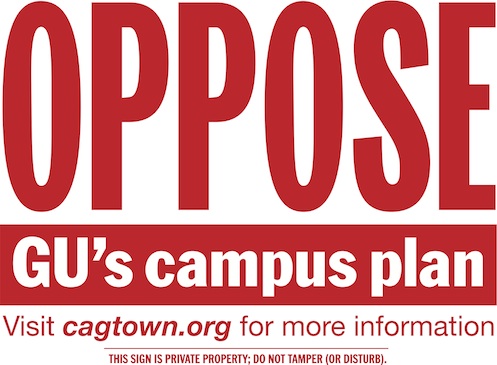Citizens react to Post's endorsement of Campus Plan

Citizens groups in Georgetown had strong reactions to The Washington Post's editorial endorsing Georgetown University's proposed 10-year Campus Plan.
The Citizens Association of Georgetown led by President Jennifer Altemus sent the following letter to the editor in response to the Post's commentary:
Monday's Washington Post editorial in favor of Georgetown University's 10-year campus plan ignores the fact that the proposal would clearly put the university in violation of zoning regulation 210-2: "Use as a college or university shall be located so that it is not likely to become objectionable to neighboring properties because of noise, traffic, number of students, or other objectionable conditions."
The editorial unfairly states that those opposing the plan are "disinterested in promoting a knowledge-based economy." That is simply not true. We strongly support planned and thoughtful growth. We strongly oppose, however, the objectionable results an expansion of more than 4,000 students in the past 10 years has had on the communities surrounding Georgetown University.
It is important to note that in 2000, the university stated that in 10 years the number of students living in the adjoining neighborhoods would decrease, that total enrollment would be under 10,000, and that the number of group homes would decline significantly. None of these assertions has proved valid. Rather, total university enrollment has increased to more than 14,000, and the 2010-2020 plan calls for close to 15,000 students by 2020.
The result of students living in the residential areas is an unacceptable level of noise, poorly maintained homes and yards, unchecked trash violations, and a lack of adequate parking. None of the university's attempts to address these accelerating problems has succeeded. The 2010-2020 campus plan exacerbates the negative consequences of the previous expansions to the surrounding communities.
The city's Office of Planning has told the university that it must house 100 percent of its students on campus or on sites outside Zip code 20007, thus agreeing that Georgetown has violated zoning regulation 210-2. In an unprecedented show of support, Mayor Vincent Gray; D.C. Council members Jack Evans, Mary Cheh, Vincent Orange and Phil Mendelson; and advisory neighborhood commissions 2E and 3D have joined the Citizens Association of Georgetown, the Burleith Citizens Association and the Foxhall Community Citizens Association in opposing this 10-year plan. The District, rightfully so, recognizes that a strong remedy is necessary in order to repair the damage Georgetown University's enrollment and housing policies have inflicted on these residential communities for more than 20 years of unchecked growth.
The Washington Post editorial states that the notion of a satellite campus is "laughable." However, the university already has a site in Arlington for its continuing-studies students and near Capitol Hill for its law school, so the idea is not unreasonable. Schools around the country house their students on campus and/or have satellite campuses.
If Georgetown University is allowed to continue to expand irresponsibly, the danger exists that valued residential neighborhoods will become predominantly student housing. Such a development would be a significant loss not only to the residents but also to the city as a whole.
Meanwhile, several unaffiliated residents sent the following letter to The Northwest Current.
As residents of the communities near Georgetown University, we want to applaud the recent steps the University has taken to maintain the quality of life in our neighborhoods.
Since school started this year, GU has deployed twice-daily trash patrols on the streets of west Georgetown and Burlieth, collecting more than 100 tons of trash--including non-University trash. GU has hired 7 MPD officers to patrol on Thursday, Friday and Saturday evenings, working with Campus Security officers to prevent and deter crime on our neighborhood streets. In addition, the University has started a new shuttle bus service to take students to and from M Street, which means fewer students traveling on-foot through our neighborhoods late at night.
Each of these new initiatives benefits residents who live near the University. But all District residents benefit from the economic development and services that the University provides to D.C. Georgetown University is the largest private employer in the city, employing more than 9,800 people, 40 percent of whom live in DC. Last year, the University spent $86 million on goods and services from DC businesses. GU undergraduates and graduate students provide countless hours of volunteer public service to District residents each year at free health clinics, soup kitchens, and other social service agencies. Overall, Georgetown University’s positive impact on our city is broad and deep. When the University prospers, it enhances all of our lives.
We also applaud the University for listening to its neighbors to the west by removing the so-called “loop road” proposal from the Campus Plan. GU is now proposing an approach to providing better internal circulation for its commuter shuttle busses that will reduce the number of buses on neighborhood streets without building the loop road. It’s a win-win-win for everyone.
Whether we moved here recently or years ago, we each made a decision to live near Georgetown University, knowing that there are pluses and minuses to living near any large institution. On balance, we continue to think that the benefits of living near the University far exceed any negative impacts.
We appreciate the importance of Georgetown University to our neighborhood and support its Campus Plan which includes these new community initiatives. And, we thank Georgetown University for its continuing efforts to enhance our city and to be a good neighbor.
Grace Bateman, Georgetown
Elliott Crooke, Foxhall
John Doolittle, Cloisters
Erika Higley, Glover Park
Charlie Skuba, Hillandale
Tom & Sarah Strike, Burleith





